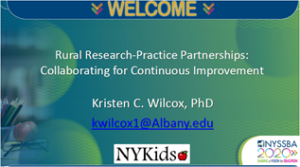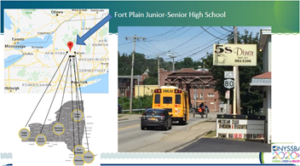Rural Research-Practice Partnerships: Collaborating for Continuous Improvement
by Kristen C. Wilcox & Jessie Tobin
Educators in rural schools, like in other school contexts (Kerner & Hall, 2009; Sorensen & Fleming, 2004), are increasingly expected to use relevant research to guide school and district improvements and show measurable gains in student outcomes.
 Unfortunately, formidable challenges exist in using practice-based research. The first is that district and school leaders often do not have time or access to identify relevant research to derive practice strategies for educators. The second issue is that leaders, including school board members, are often not active partners with frontline educators in developing and supporting improvement initiatives. These challenges become more salient for rural schools where “ready-made” improvement strategies often do not consider the unique attributes of rural communities.
Unfortunately, formidable challenges exist in using practice-based research. The first is that district and school leaders often do not have time or access to identify relevant research to derive practice strategies for educators. The second issue is that leaders, including school board members, are often not active partners with frontline educators in developing and supporting improvement initiatives. These challenges become more salient for rural schools where “ready-made” improvement strategies often do not consider the unique attributes of rural communities.
A growing body of research suggests that rural districts benefit from using research that takes into account the unique qualities of rural contexts as well as collaborative partnerships to improve student outcomes (Harmon, 2017; Wilcox & Zuckerman, 2019). Research-practice partnerships offer one promising option.
What is a RPP?
Research-Practice Partnerships (RPP) are defined as “long-term mutualistic collaborations between practitioners and researchers intentionally organized to investigate problems of practice and solutions for improving district outcomes” (Coburn, Penuel, and Geil, 2013). RPPs offer promise for building rural schools’ capacities for improvement (Wilcox and Zuckerman, 2019). This is particularly impactful when guided by improvement science (IS) based processes.
As described in previous NYKids blogs, Improvement Science is predicated on a number of principles that implicate school board members’ involvement in the collaborative co-creation of improvement plans and subsequent support of improvement initiatives. IS emphasizes the importance of making the work “problem-specific and user-centered” (Bryk, Gomez, Grunow, & LeMahieu, 2015, p. 12). It also encourages improvers to see the system that produces the outcomes and then work in disciplined ways to set aims and measure progress.
NYKids – as a public-private research-practice partnership housed in the University at Albany’s School of Education and funded by the State of New York – has developed resources and tools that RPPs can use to advance collaborative improvement initiatives. The main resource is our COMPASS-AIM process which engages teams of school and district leaders and educators in applying findings from NYKids’ as well as other research on odds-beating/positive outlier schools through an improvement science-based process for continuous improvement.
Announcing the Upcoming NYKIDS NYSSBA Conference Presentation
R&D Director Kristen C. Wilcox will be presenting on NYKids work in rural schools and focusing on the important role of School Board members in school improvement efforts. This session will center around a case study where Fort Plain Central School District, as part of a rural RPP, used Improvement Science-based processes via NYKids COMPASS-AIM in collaboration with the Capital Area School Development Association (CASDA) to build and sustain a collaborative partnerships for a school-wide and district-wide continuous improvement effort.
 The session will begin with a discussion of how innovations are spread across organizations and open up for an interactive discussion with participants regarding the readiness for change in their organizations.
The session will begin with a discussion of how innovations are spread across organizations and open up for an interactive discussion with participants regarding the readiness for change in their organizations.
Next, Dr. Wilcox will describe NYKids research including findings about continuous improvement and will feature the rural district RPP case study where the NYKids team served as the RPP hub to support a district-wide improvement effort to address chronic absenteeism and literacy performance gaps at the elementary level.
The session will end by engaging participants in peer-to-peer conversations about ways to connect to a RPP and use Improvement Science-based processes and tools. Key learning outcomes for participants include:
- Identifying salient characteristics of processes and systems for improvement that can be utilized by school board members and other leaders in rural school district settings.
- Identifying how RPPs can offer a framework for district-wide collaboration and leadership for improvement in rural school communities.
- Identifying strategies to mitigate obstacles for RPP-supported improvement in P-12 rural schools.
To participate in this session see the New York State School Boards Association (NYSSBA) Annual Convention & Education Expo Conference site at http://convention.nyssba.org/ . Dr. Wilcox will be presenting from 9:25-10:10 on Wednesday October 28th.
